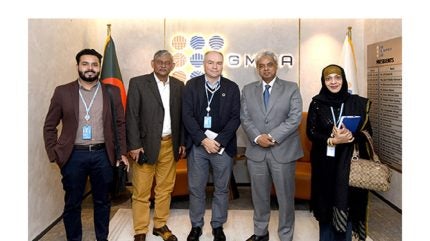
On 5 January 2025, ILO country director Tuomo Poutiainen engaged in a strategic dialogue with BGMEA administrator Anwar Hossain.
The meeting held at the BGMEA Complex was also joined by ANM Saifuddin, a member of the BGMEA Support Committee.
The conversation also delved into the ongoing initiatives led by the ILO, notably the Better Work Bangladesh programme, which aims to enhance working conditions and ensure the occupational safety of garment workers.
Poutiainen and Hossain stressed the importance of sustained endeavours to establish safer, more equitable, and sustainable workplaces within the garment sector.
The dialogue explored avenues for future cooperation between the ILO and BGMEA. This includes capacity building congruent with international norms such as the European Union’s Due Diligence Directive that holds companies responsible for human rights and environmental standards throughout their supply chains.
Adopted by the EU in April 2024, the Corporate Sustainability Due Diligence Directive (CSDDD) represents an important move towards establishing more accountable global supply chains, aiming to eliminate human rights violations, labour exploitation, and environmental harm.

US Tariffs are shifting - will you react or anticipate?
Don’t let policy changes catch you off guard. Stay proactive with real-time data and expert analysis.
By GlobalDataHossain also showcased the industry’s advancements in workplace safety, workers’ rights, and environmental sustainability. He reaffirmed the sector’s dedication to ongoing improvements in these areas.
The BGMEA representatives requested that the ILO consider projects to enhance social dialogue and foster harmonious industrial relations within Bangladesh’s RMG sector. They also called for collaboration on workforce skill development in response to AI and technological advancements.
A study spearheaded by the Bangladesh Labour Foundation (BLF) and conducted by BRAC University scholars found that technological enhancements in Bangladesh’s RMG sector have led to a 30.58% decline in employment opportunities.
Last month, Hossain met with several ambassadors including Michael Miller, ambassador and head of the delegation of the EU to Bangladesh.
During the meeting, he stated that the government, along with stakeholders such as the ILO, is actively collaborating to improve labour rights and welfare standards.
The talks revolved around important trade matters, emphasising sustainability, bolstering EU-Bangladesh partnerships, and fostering cooperation between them to advance the country’s garment industry.
Both parties also discussed potential collaborations on corporate sustainability, EU due diligence regulations, and aligning Bangladesh’s RMG sector with new EU laws.



